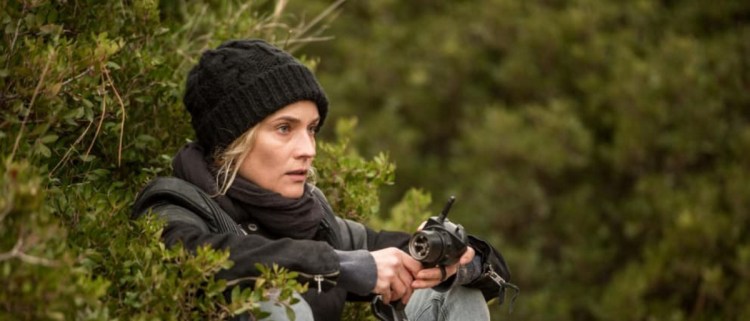In German director Fatih Akin’s new film “In the Fade,” we are reminded once again that the world is a dangerous place, not that we needed the nudge.
In the first of three acts, we meet Katja Sekerci (Diane Kruger), as she waits to welcome her husband Nuri (Numan Acar) as he is leaving prison.
In the short time we get to know Nuri, it seems clear that his imprisonment for drug use has changed his life, and now he seems eager to build a business helping immigrants get a start in Germany.
It’s a store front business for which Katja does the bookkeeping and lends moral support.
He seems happy being there with his sweet son, Rocco (Rafael Santana), and all seems cozy until one afternoon a bike left outside on the street explodes.
When Katja arrives later in a cold rain, she sees the wreckage and is told her husband and child were both killed.
An act of terrorism or revenge on Nuri from the bad days?
But earlier on the fated day, Katja had seen a young blonde woman leave her bike with a metal case attached on the street. When the police show her pictures, she identifies the woman: She is one of two neo-Nazi terrorists.
But the film stalls a bit as Katja, now suffering from total emotional shock, fades into a blurry cloud of daily cocaine and meth.
Two: The Trial.
Katja and her good family friend and lawyer Danilo Fava (Denis Moschitto) sit across from the two terrorists, a disarmingly youthful couple (Ulrich Brandhoff and Hanna Hilsdorf) and their attorney, a Machiavellian Johannes Krisch, a skeletal man with the visage of a Dr. Mengele understudy.
With the aid of deceit and neo-Nazi false witnesses, plus evidence of Katja’s drug use, the duo are found not guilty.
Act 3:
The shock of this injustice sets Katja to plotting revenge. Danilo, the lawyer, offers a promising appeal, but numbed and focused on revenge, Katja hatches her own idea of justice.
Up until now, based on what we’ve seen in previews, we expected a Liam Neeson thriller — turn into the dark alleys of Berlin, with Katja going into the sewers of the very real neo-Nazi underground, risking life and limb to expose and destroy the killers.
But director Akin and co-writer Hark Bohm are of another school of thought, keeping Katja and her plot in plain sight, as she works her revenge above ground in the gray light of day.
She will, still numbed by pain, and with ice-cold perseverance find her tormentors on an idyllic, sunny, windswept beach, living a life of joyful freedom in a mobile trailer.
Her plan and the final act will not be what we expect. It will come like a dark cloud that promises soothing rain, but holds instead a bolt of selfish lightning.
Akin’s direction is slightly less than exceptional, and for me, just a few steps up from your average European thriller. His cast, a nice mix of Europeans and Middle Eastern actors are well chosen.
Luckily for Akin, he enlisted the wonderful gifts of Kruger, who enchanted as the Asperger affected detective in the TV series “The Bridge” to a comical spy turn in “Inglourious Basterds.” It is Kruger who holds the film in her hands and never lets it slip away.
Katja is an enormously difficult puzzle to solve for any actress, but Kruger, who won best actress at Cannes, embraces it, inhales all of its darkness, and lifts it to something far above stunning.
“In the Fade” is exactly the heat we need in this winter of discontent.
J.P. Devine, of Waterville, is a former stage and film actor.
Send questions/comments to the editors.



